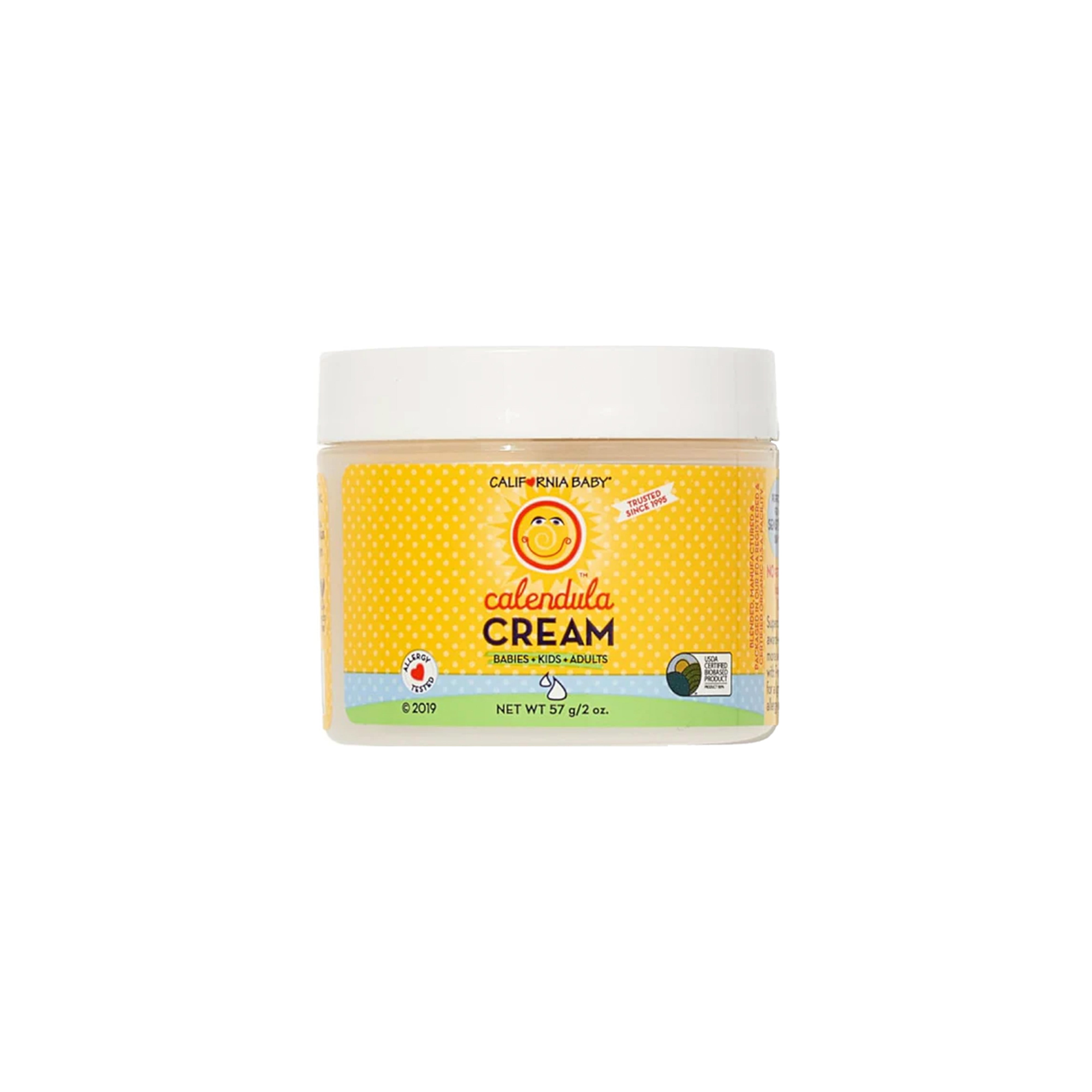
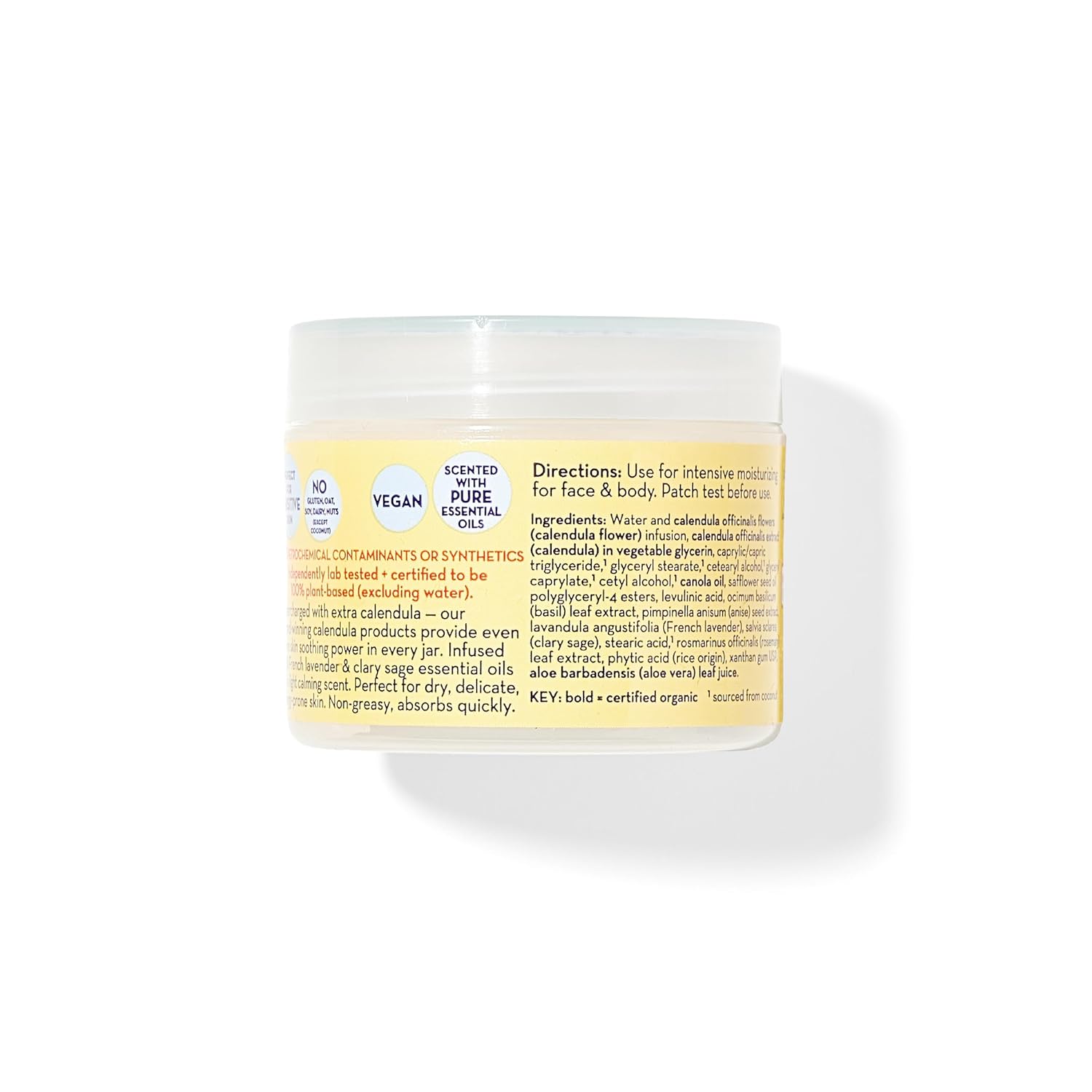
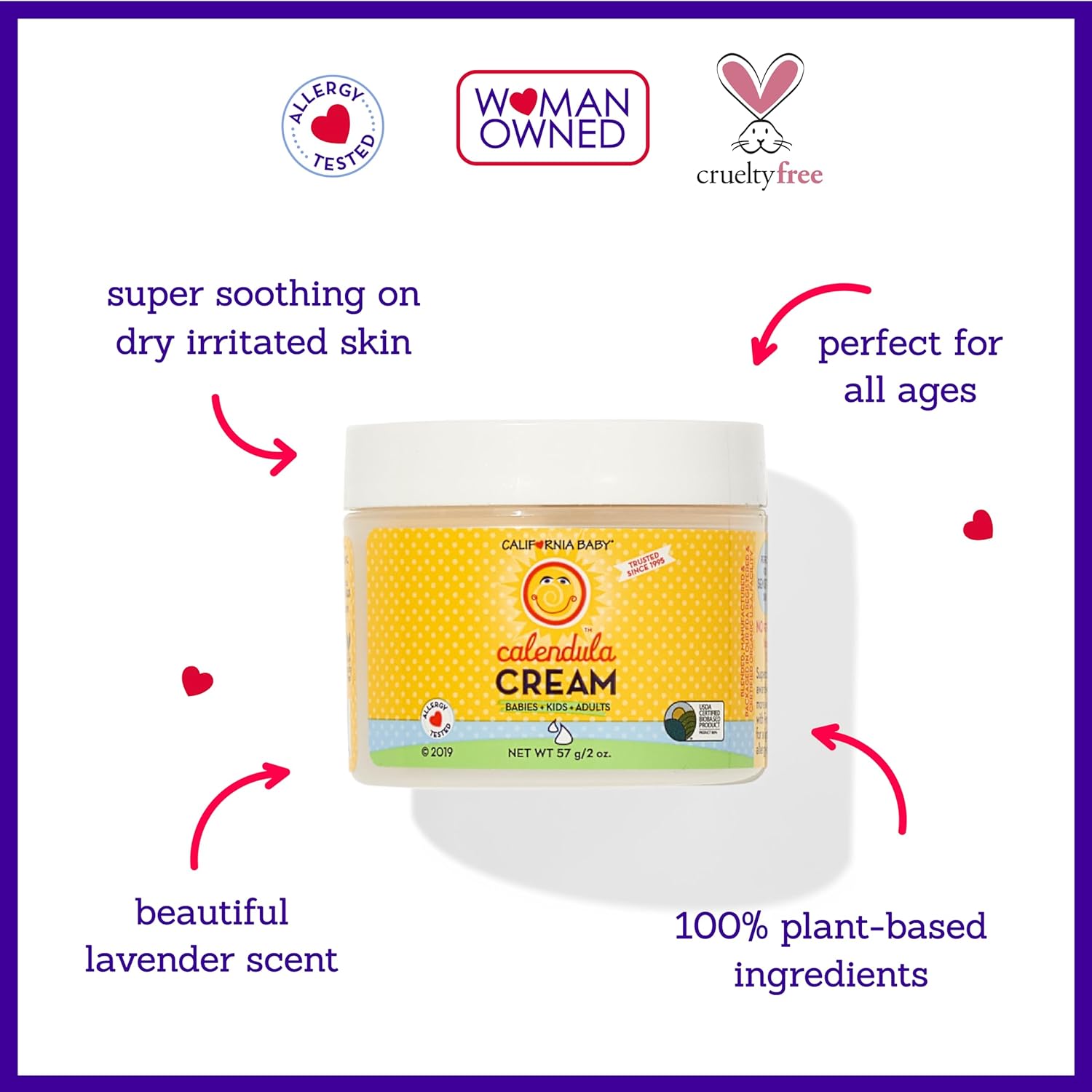
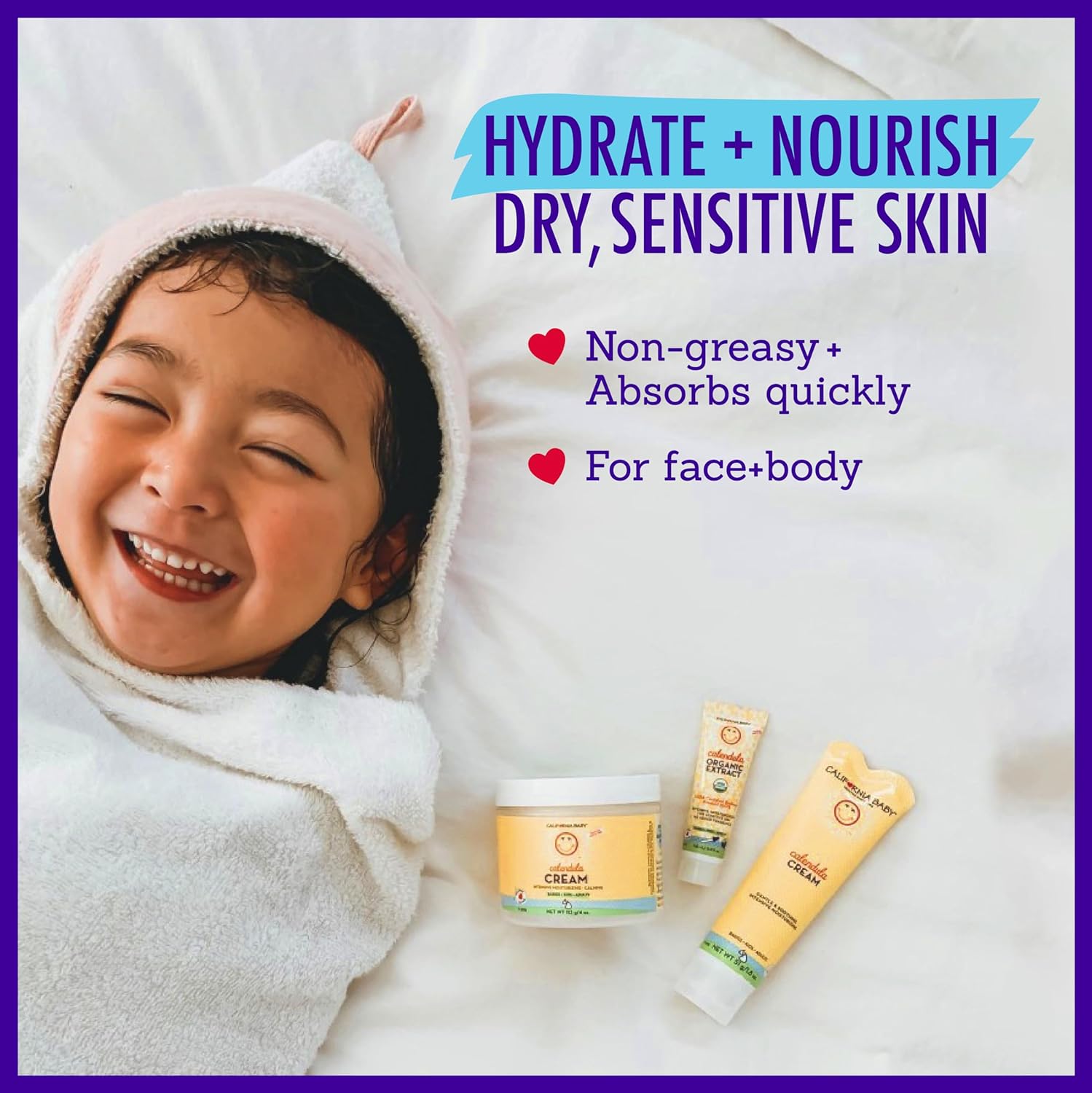
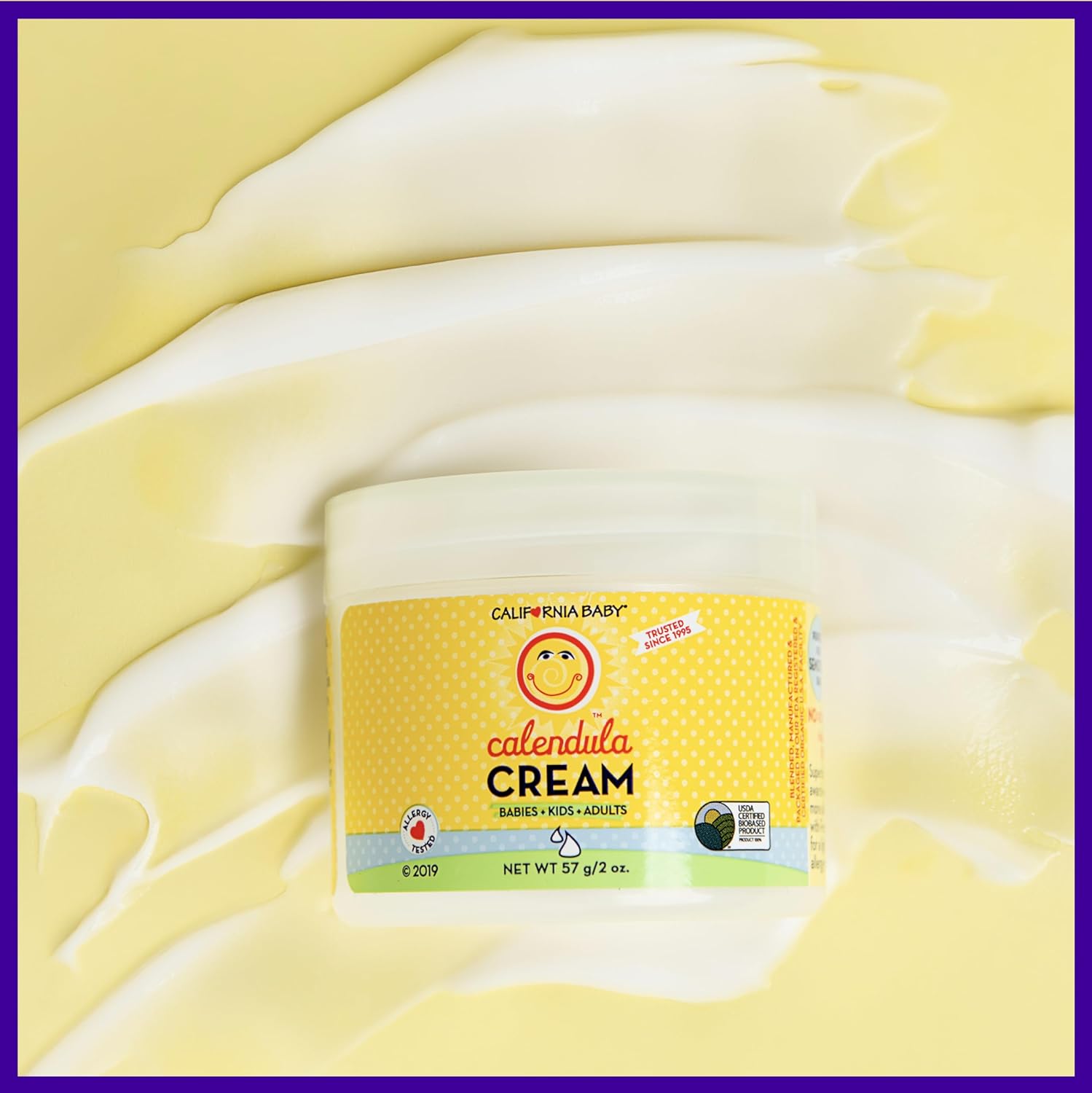
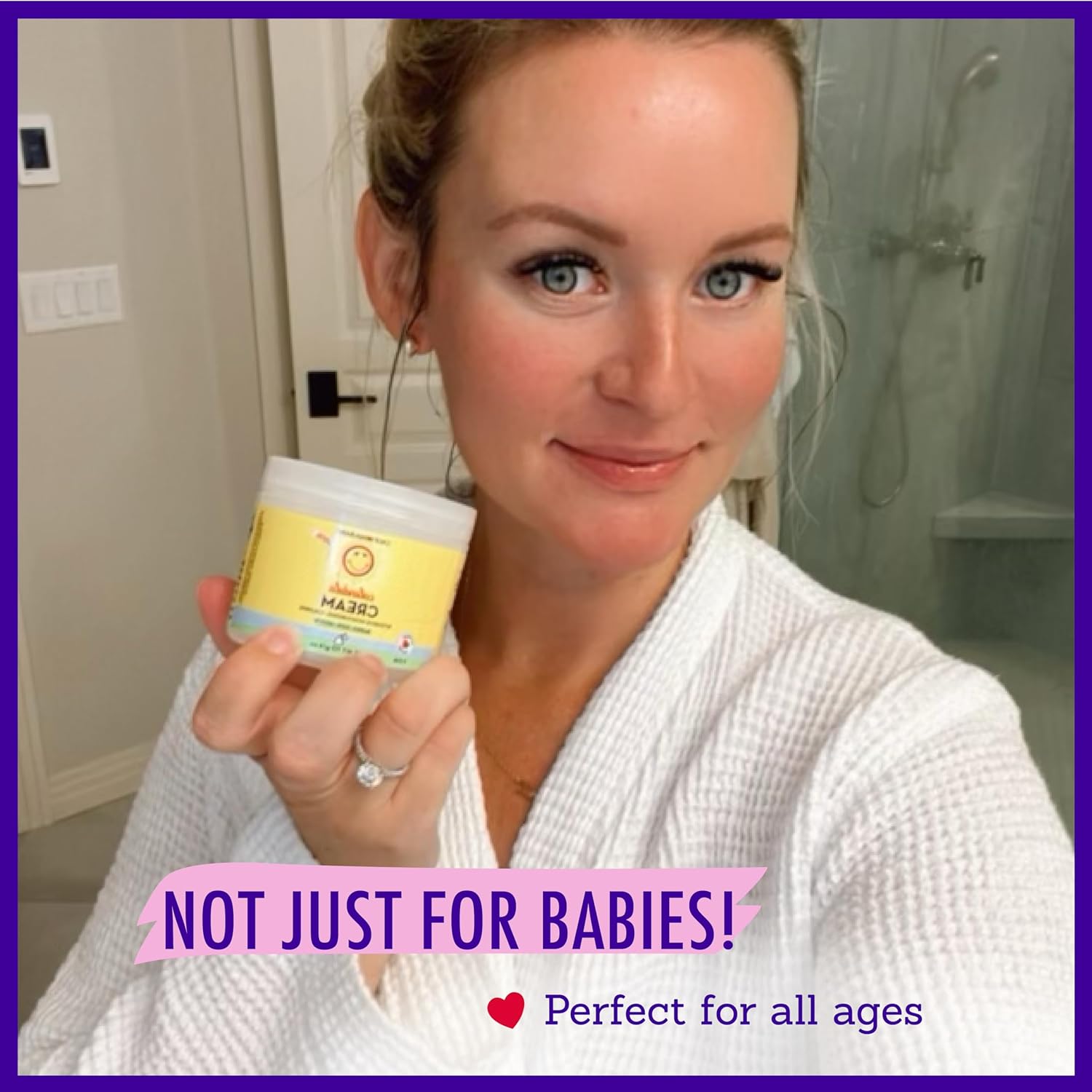
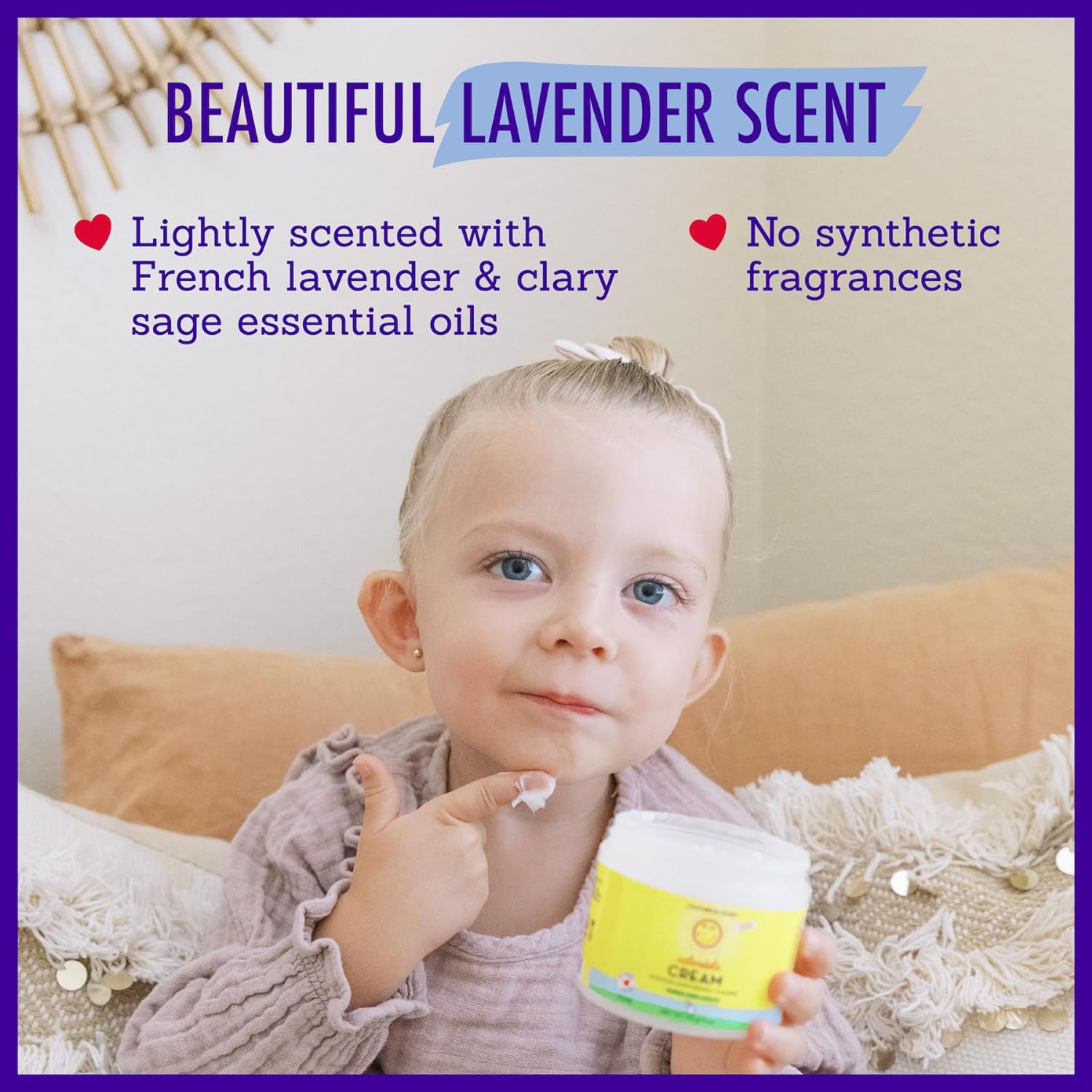
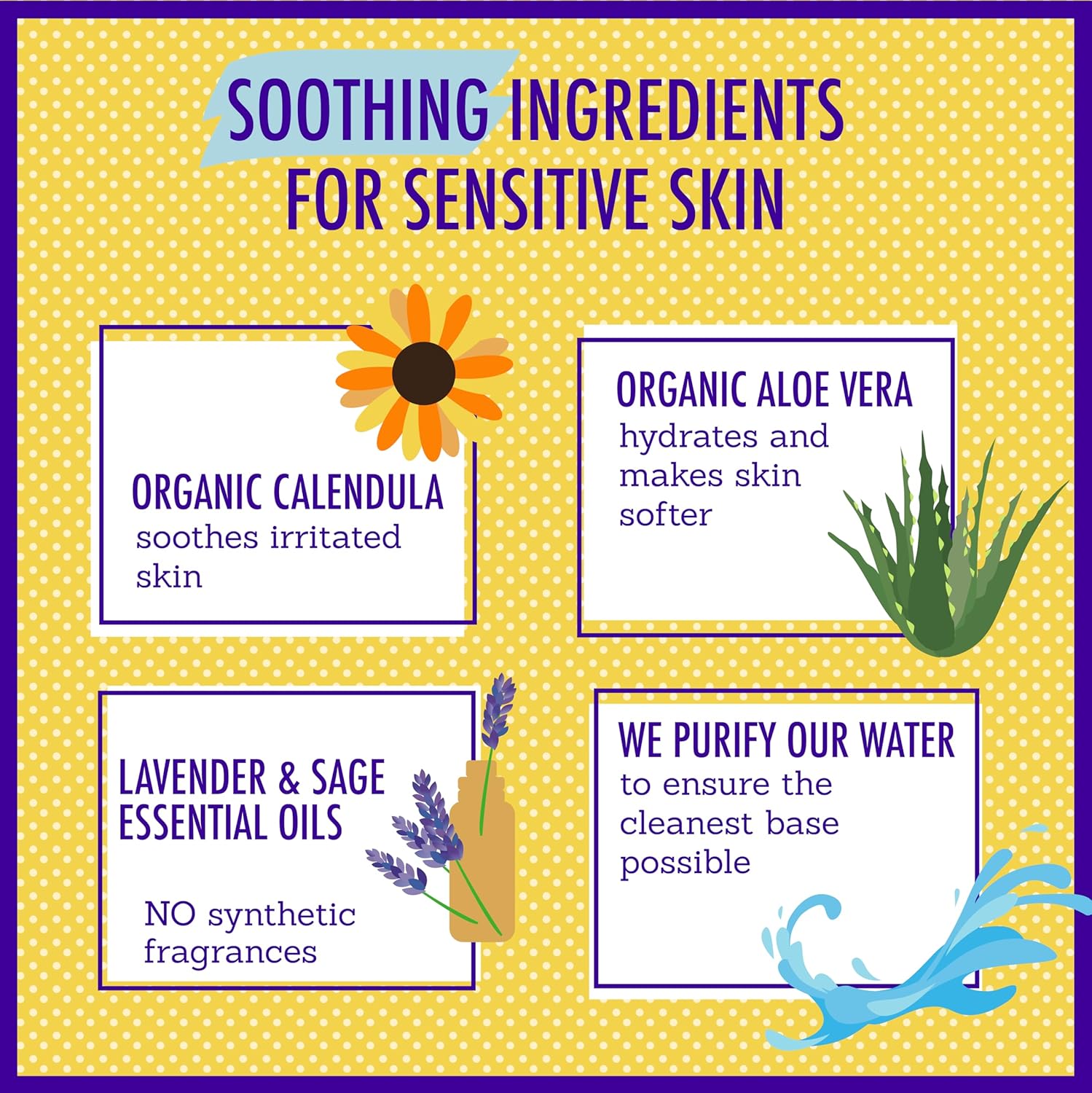
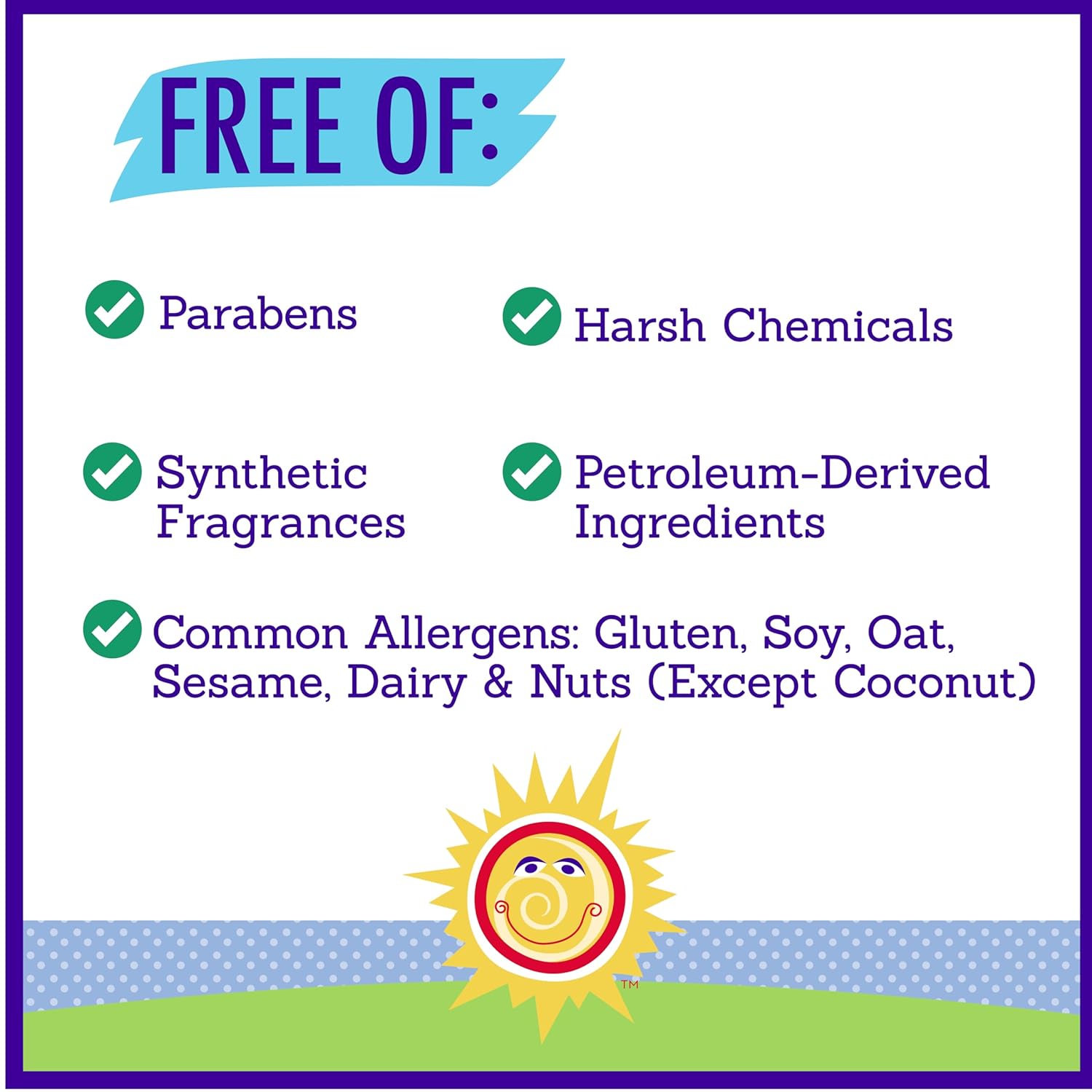
California Baby Calendula Cream - Soothes Sensitive Skin, Allergy Tested, Lavender Scent - 2 oz


Polyaminopropyl Biguanide
High RiskPolyaminopropyl biguanide is a synthetic polymer used primarily as a preservative and antimicrobial agent in personal care and household products. It functions by inhibiting the growth of bacteria and fungi, thereby extending product shelf life and maintaining safety for users.
Sustai Insights
Polyaminopropyl biguanide effectively serves as a preservative, enhancing product longevity. However, it has been associated with skin irritation and has high use restrictions, indicating potential safety concerns. Regulatory bodies have issued warnings regarding its use, categorizing it as high risk due to these adverse health effects. Additionally, its environmental impact raises concerns about pollution and bioaccumulation. Safe usage practices are recommended, and alternatives such as natural preservatives should be considered.
Cocos Nucifera (Coconut)
Medium RiskCocos Nucifera, commonly known as coconut, is derived from the coconut palm. It is widely used in various cosmetic and personal care products for its moisturizing properties, acting as an emollient and skin-conditioning agent, enhancing texture and hydration.
Sustai Insights
Cocos Nucifera offers functional benefits such as effective moisturization and conditioning for the skin, while being biodegradable and often sustainably sourced. Health risks are minimal, with low concerns for carcinogenicity, allergies, and reproductive toxicity. Environmental risks are also low, as it does not accumulate in organisms or significantly pollute. Regulatory bodies do not impose restrictions, supporting its overall low-risk status. Safe usage practices include patch testing for sensitivities, though alternatives like shea butter or jojoba oil may offer similar benefits.
Cetyl Alcohol
Low RiskCetyl alcohol is a long-chain organic alcohol commonly used in cosmetic formulations. It serves as an emollient, emulsifier, and thickening agent, enhancing the texture and stability of products. Cetyl alcohol is derived from natural sources, such as coconut or palm oil, and is often included in creams, lotions, and hair conditioners.
Sustai Insights
Cetyl alcohol offers functional benefits as an emollient and emulsifier, improving product texture and stability. It is biodegradable and sourced from renewable materials, contributing to sustainability. Health risks are minimal, with low concerns for carcinogenicity, allergies, or reproductive toxicity. Environmental impact is also low, with no significant pollutant or bioaccumulation potential. Regulatory bodies have not placed restrictions on its use, indicating a favorable safety profile. Overall, cetyl alcohol is assessed as low risk, and safe usage practices include ensuring proper formulation concentrations.
Aloe Barbadensis (Aloe Vera)
Low RiskAloe barbadensis, commonly known as aloe vera, is derived from the succulent leaves of the aloe plant. It is widely used in cosmetic products for its soothing and moisturizing properties, often included for its potential skin benefits.
Sustai Insights
Aloe vera provides effective moisturizing and soothing benefits for the skin, supporting its use in various cosmetic formulations. It is generally considered safe, with low concerns for carcinogenicity, allergies, and reproductive toxicity. Regulatory bodies impose minimal restrictions, underlining its low-risk profile. While environmental impacts are minimal, its sustainability credentials depend on sourcing practices. Safe usage includes topical application, with no significant adverse effects reported. Alternatives exist, such as plant-based gels, but aloe vera remains a favored choice due to its low-risk assessment.
Tocopherol, D Alpha
Low RiskTocopherol, specifically d-alpha tocopherol, is a naturally occurring form of Vitamin E. It is commonly used in cosmetic and personal care products primarily for its antioxidant properties, helping to protect formulations from oxidation and extend shelf life.
Sustai Insights
D-alpha tocopherol provides effective antioxidant benefits, contributing to product stability. It is sustainably sourced and generally regarded as safe, with low concerns regarding carcinogenicity, allergies, and reproductive toxicity. However, there are minor concerns about endocrine disruption. Regulatory bodies have not imposed significant restrictions, indicating low overall risk. Recommended usage practices include adhering to established safe concentration thresholds. Alternatives, such as other forms of Vitamin E or plant-based antioxidants, may also be considered.
Calendula Officinalis (Pot Marigold)
Low RiskCalendula officinalis, commonly known as pot marigold, is a flowering plant used in various cosmetic and therapeutic applications. It is primarily recognized for its soothing properties in skincare formulations, often included for its potential anti-inflammatory and healing effects.
Sustai Insights
Calendula officinalis offers functional benefits, particularly in soothing and healing skin irritations, and is often sustainably sourced. Health risks are minimal, with low concerns regarding carcinogenicity, allergies, and reproductive toxicity. Environmental risks are also low, and regulatory status is generally favorable, with few restrictions. Overall, it presents a low-risk profile, making it a reliable ingredient in formulations.
Xanthan Gum
Low RiskXanthan gum is a polysaccharide, a sugar-based compound produced by the fermentation of glucose or sucrose. It is commonly used as a thickening agent and stabilizer in various food and cosmetic products due to its ability to improve texture and prevent ingredient separation.
Sustai Insights
Xanthan gum serves effectively as a thickener and stabilizer, enhancing product texture and consistency. It is biodegradable and typically derived from renewable sources, supporting sustainability efforts. Health risks are minimal, with low concerns regarding carcinogenicity, allergies, and reproductive toxicity. Environmental impact is similarly low, posing no significant hazards. Regulatory agencies, including the FDA, regard it as safe for use, with no significant restrictions. Overall, xanthan gum is assessed as low risk, making it a suitable ingredient in formulations.
Caprylic Triglyceride
Low RiskCaprylic triglyceride is an ester derived from coconut oil and glycerin, commonly used in cosmetic formulations as an emollient, stabilizer, and skin-conditioning agent. It helps to improve the texture and spreadability of products while providing a lightweight, non-greasy feel.
Sustai Insights
Caprylic triglyceride offers functional benefits such as enhanced skin moisturization and improved formulation stability. It is generally regarded as safe, with low concerns regarding carcinogenicity, allergenic potential, and reproductive toxicity. Environmental impact is minimal, with no significant pollutant or bioaccumulative properties identified. Regulatory bodies have not issued warnings or restrictions. Overall, the risk level is low, making it a suitable ingredient in cosmetic products. Safe usage practices include adhering to recommended concentrations, and while there are alternatives, caprylic triglyceride remains a reliable choice.
Cetyl Alcohol
Low RiskCetyl alcohol is a long-chain organic alcohol commonly used in cosmetic formulations. It serves as an emollient, emulsifier, and thickening agent, enhancing the texture and stability of products. Cetyl alcohol is derived from natural sources, such as coconut or palm oil, and is often included in creams, lotions, and hair conditioners.
Sustai Insights
Cetyl alcohol offers functional benefits as an emollient and emulsifier, improving product texture and stability. It is biodegradable and sourced from renewable materials, contributing to sustainability. Health risks are minimal, with low concerns for carcinogenicity, allergies, or reproductive toxicity. Environmental impact is also low, with no significant pollutant or bioaccumulation potential. Regulatory bodies have not placed restrictions on its use, indicating a favorable safety profile. Overall, cetyl alcohol is assessed as low risk, and safe usage practices include ensuring proper formulation concentrations.
Aloe Barbadensis (Aloe Vera)
Low RiskAloe barbadensis, commonly known as aloe vera, is derived from the succulent leaves of the aloe plant. It is widely used in cosmetic products for its soothing and moisturizing properties, often included for its potential skin benefits.
Sustai Insights
Aloe vera provides effective moisturizing and soothing benefits for the skin, supporting its use in various cosmetic formulations. It is generally considered safe, with low concerns for carcinogenicity, allergies, and reproductive toxicity. Regulatory bodies impose minimal restrictions, underlining its low-risk profile. While environmental impacts are minimal, its sustainability credentials depend on sourcing practices. Safe usage includes topical application, with no significant adverse effects reported. Alternatives exist, such as plant-based gels, but aloe vera remains a favored choice due to its low-risk assessment.
Tocopherol, D Alpha
Low RiskTocopherol, specifically d-alpha tocopherol, is a naturally occurring form of Vitamin E. It is commonly used in cosmetic and personal care products primarily for its antioxidant properties, helping to protect formulations from oxidation and extend shelf life.
Sustai Insights
D-alpha tocopherol provides effective antioxidant benefits, contributing to product stability. It is sustainably sourced and generally regarded as safe, with low concerns regarding carcinogenicity, allergies, and reproductive toxicity. However, there are minor concerns about endocrine disruption. Regulatory bodies have not imposed significant restrictions, indicating low overall risk. Recommended usage practices include adhering to established safe concentration thresholds. Alternatives, such as other forms of Vitamin E or plant-based antioxidants, may also be considered.
Calendula Officinalis (Pot Marigold)
Low RiskCalendula officinalis, commonly known as pot marigold, is a flowering plant used in various cosmetic and therapeutic applications. It is primarily recognized for its soothing properties in skincare formulations, often included for its potential anti-inflammatory and healing effects.
Sustai Insights
Calendula officinalis offers functional benefits, particularly in soothing and healing skin irritations, and is often sustainably sourced. Health risks are minimal, with low concerns regarding carcinogenicity, allergies, and reproductive toxicity. Environmental risks are also low, and regulatory status is generally favorable, with few restrictions. Overall, it presents a low-risk profile, making it a reliable ingredient in formulations.
Xanthan Gum
Low RiskXanthan gum is a polysaccharide, a sugar-based compound produced by the fermentation of glucose or sucrose. It is commonly used as a thickening agent and stabilizer in various food and cosmetic products due to its ability to improve texture and prevent ingredient separation.
Sustai Insights
Xanthan gum serves effectively as a thickener and stabilizer, enhancing product texture and consistency. It is biodegradable and typically derived from renewable sources, supporting sustainability efforts. Health risks are minimal, with low concerns regarding carcinogenicity, allergies, and reproductive toxicity. Environmental impact is similarly low, posing no significant hazards. Regulatory agencies, including the FDA, regard it as safe for use, with no significant restrictions. Overall, xanthan gum is assessed as low risk, making it a suitable ingredient in formulations.
Polyaminopropyl Biguanide
High RiskPolyaminopropyl biguanide is a synthetic polymer used primarily as a preservative and antimicrobial agent in personal care and household products. It functions by inhibiting the growth of bacteria and fungi, thereby extending product shelf life and maintaining safety for users.
Sustai Insights
Polyaminopropyl biguanide effectively serves as a preservative, enhancing product longevity. However, it has been associated with skin irritation and has high use restrictions, indicating potential safety concerns. Regulatory bodies have issued warnings regarding its use, categorizing it as high risk due to these adverse health effects. Additionally, its environmental impact raises concerns about pollution and bioaccumulation. Safe usage practices are recommended, and alternatives such as natural preservatives should be considered.
Cocos Nucifera (Coconut)
Medium RiskCocos Nucifera, commonly known as coconut, is derived from the coconut palm. It is widely used in various cosmetic and personal care products for its moisturizing properties, acting as an emollient and skin-conditioning agent, enhancing texture and hydration.
Sustai Insights
Cocos Nucifera offers functional benefits such as effective moisturization and conditioning for the skin, while being biodegradable and often sustainably sourced. Health risks are minimal, with low concerns for carcinogenicity, allergies, and reproductive toxicity. Environmental risks are also low, as it does not accumulate in organisms or significantly pollute. Regulatory bodies do not impose restrictions, supporting its overall low-risk status. Safe usage practices include patch testing for sensitivities, though alternatives like shea butter or jojoba oil may offer similar benefits.
Caprylic Triglyceride
Low RiskCaprylic triglyceride is an ester derived from coconut oil and glycerin, commonly used in cosmetic formulations as an emollient, stabilizer, and skin-conditioning agent. It helps to improve the texture and spreadability of products while providing a lightweight, non-greasy feel.
Sustai Insights
Caprylic triglyceride offers functional benefits such as enhanced skin moisturization and improved formulation stability. It is generally regarded as safe, with low concerns regarding carcinogenicity, allergenic potential, and reproductive toxicity. Environmental impact is minimal, with no significant pollutant or bioaccumulative properties identified. Regulatory bodies have not issued warnings or restrictions. Overall, the risk level is low, making it a suitable ingredient in cosmetic products. Safe usage practices include adhering to recommended concentrations, and while there are alternatives, caprylic triglyceride remains a reliable choice.
Discover the gentle touch of California Baby Calendula Cream, an ultra-soothing face cream designed for sensitive skin. This 100% plant-based moisturizer combines organic calendula and aloe vera to effectively soothe and hydrate delicate skin. Perfect for all ages, this allergy-friendly cream is recognized by hospitals for its calming properties.
- Soothes & Moisturizes: This award-winning lotion quickly absorbs without greasiness, providing immediate relief for dry and irritated skin.
- 100% Plant-Based Ingredients: Formulated with USDA certified biobased ingredients, ensuring no harsh chemicals touch your baby's skin.
- Delightful Lavender Scent: Lightly scented with French lavender and pure essential oils, free from synthetic fragrances, promoting a calming atmosphere.
- Strictly Allergy Tested: Designed for the most sensitive skin, free from gluten, soy, dairy, and other common allergens, ensuring safety for your little one.
- Trusted Since 1995: Family-owned and operated, California Baby products are made in FDA registered facilities, ensuring the highest quality and safety standards.
Subscribe & Save with Sustai
- Best Price Guarantee: Always enjoy the lowest prices on sustainable home essentials.
- No Surprises: We’ll notify you before shipping. No hidden fees, ever.
- You’re in Charge: Change, pause, or cancel your subscription anytime with ease.
- Eco-Friendly Deliveries: Our grouped shipments mean less packaging and lower emissions.
Join us on a sustainable journey. Special offers for a limited time! Prices and promotions may change.
Recommended Products
Discover the gentle touch of California Baby Calendula Cream, an ultra-soothing face cream designed for sensitive skin. This 100% plant-based moisturizer combines organic calendula and aloe vera to effectively soothe and hydrate delicate skin. Perfect for all ages, this allergy-friendly cream is recognized by hospitals for its calming properties.
- Soothes & Moisturizes: This award-winning lotion quickly absorbs without greasiness, providing immediate relief for dry and irritated skin.
- 100% Plant-Based Ingredients: Formulated with USDA certified biobased ingredients, ensuring no harsh chemicals touch your baby's skin.
- Delightful Lavender Scent: Lightly scented with French lavender and pure essential oils, free from synthetic fragrances, promoting a calming atmosphere.
- Strictly Allergy Tested: Designed for the most sensitive skin, free from gluten, soy, dairy, and other common allergens, ensuring safety for your little one.
- Trusted Since 1995: Family-owned and operated, California Baby products are made in FDA registered facilities, ensuring the highest quality and safety standards.

You can have at most 2 Sustainable Steals products in your cart
Customer Reviews
Customers’ View
Customers appreciate the effectiveness and gentle nature of California Baby Calendula Cream, noting its ability to soothe and moisturize delicate skin. Many users report that it works quickly to alleviate dryness and irritation, with comments like, "It’s a little miracle in a bottle" highlighting its quick results. The cream is well-received for its 100% plant-based ingredients, appealing to environmentally and health-conscious consumers. However, there are mixed feelings about the scent, with some enjoying the light lavender aroma while others find it too strong. Additionally, opinions on value for money vary; some believe it's worth the investment for its quality, while others feel it’s a bit pricey. Overall, customers find this product effective and aligned with their sustainable lifestyle.
AI-generated from the text of customer reviewsThis product is rated 4.8 of 5.0 stars.
It has received 130 reviews.




